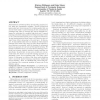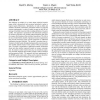1047 search results - page 58 / 210 » Learning the required number of agents for complex tasks |
ATAL
2003
Springer
14 years 1 months ago
2003
Springer
Hierarchies are powerful tools for decomposing complex control tasks into manageable subtasks. Several hierarchical approaches have been proposed for creating agents that can exec...
GECCO
2007
Springer
14 years 1 months ago
2007
Springer
An agent population can be evolved in a complex environment to perform various tasks and optimize its job performance using Learning Classifier System (LCS) technology. Due to the...
AINA
2007
IEEE
14 years 2 months ago
2007
IEEE
In the near future, homes are envisioned to be equipped with numerous intelligent communicating devices. Such smart home needs to exhibit highly adaptive behavior to meet the inha...
ECRTS
1998
IEEE
14 years 1 days ago
1998
IEEE
This paper introduces improvements in partitioning schemes for multiprocessor real-time systems which allow higher processor utilization and enhanced schedulability by using exact...
ATAL
2006
Springer
13 years 11 months ago
2006
Springer
The challenge we address is to reason about projected resource usage within a hierarchical task execution framework in order to improve agent effectiveness. Specifically, we seek ...


